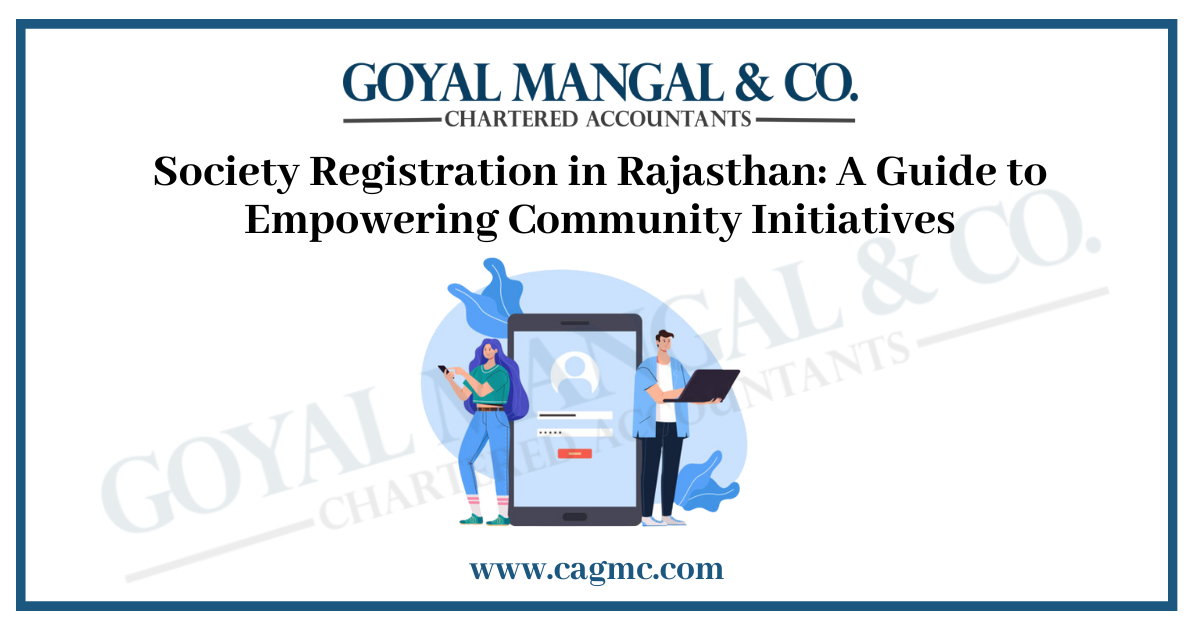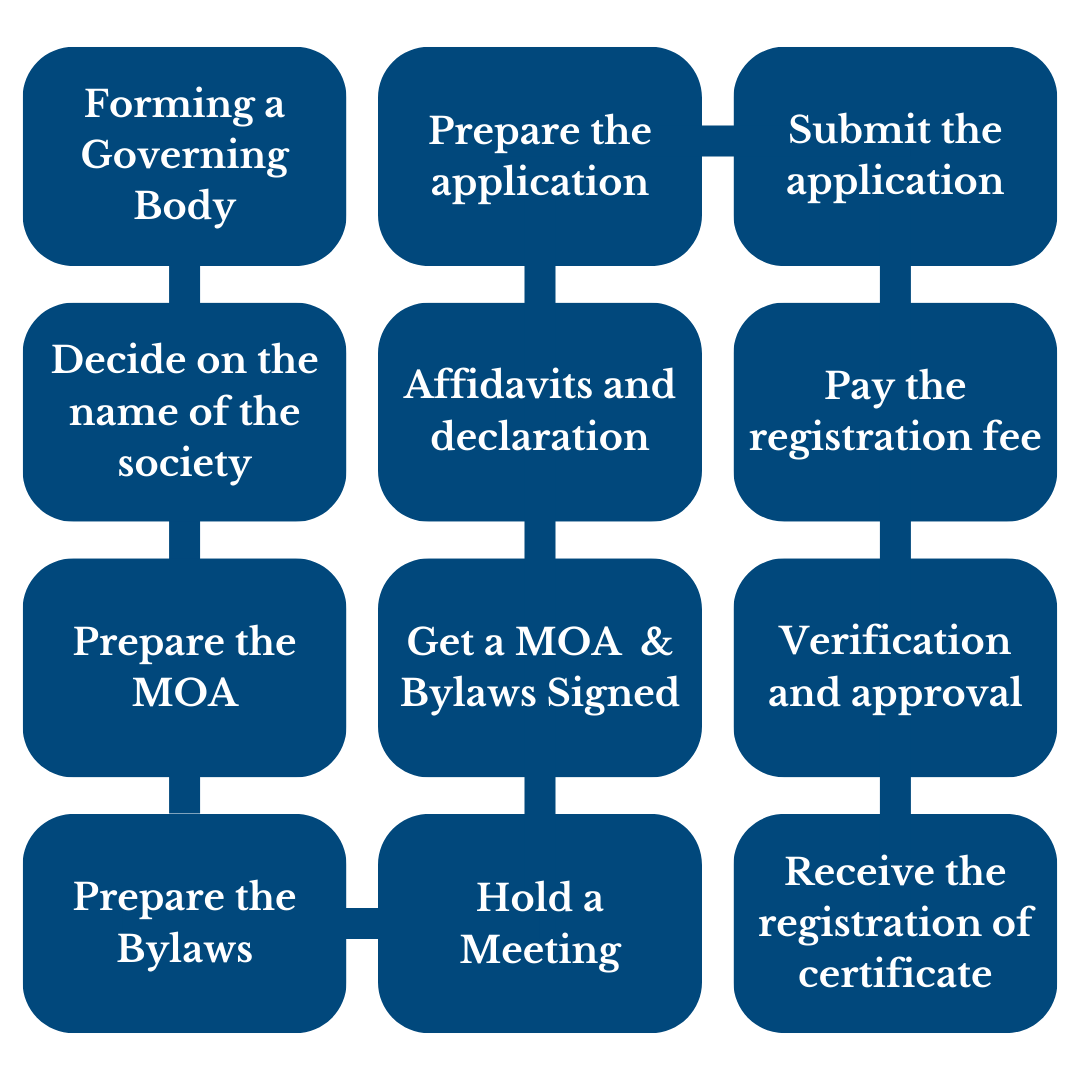
Registering a society in Rajasthan grants a legal recognition to the collective efforts of intellectual people. It is allowing them to function effectively and with transparency. With an official status, societies gain the ability to own their property, engage in partnership with several shareholders, conduct fundraising activities, and empowering their efforts. In this article, we will provide a comprehensive guidance of Society Registration in Rajasthan. Furthermore, there will be eligibility criteria, necessary documents and step-by step process of Society registration in Rajasthan.
| Table of Content |
Overview about the Society
In a general sense, the term “society” refers to a group of people who share common interests, activities, culture, or goals and interact with one another within a defined community or social structure. Societies can exist at various levels, from small local communities to large-scale national or global entities.
In the context of legal entities, a “society” often refers to a type of non-profit organization that is established to promote various social, cultural, educational, charitable, or philanthropic activities. These societies are often formed by individuals who come together with a shared vision or purpose and work collectively to achieve their objectives.
Such societies are governed by rules and regulations that outline their objectives, membership criteria, governance structure, financial management, and other operational aspects. The primary aim of these societies is not to make profits for their members but to serve the broader interests of the community or the specific cause they represent.
The registration of societies is typically done under Societies Registration Act, 1860. Once registered, these societies gain legal recognition and enjoy certain benefits and privileges, such as the ability to own property, raise funds, and enter into contracts.
Eligibility Criteria for Society registration in Rajasthan
The eligibility criteria for society registration in Rajasthan are as follows:
- Minimum Members: A society in Rajasthan should have a minimum of seven members to be eligible for registration.
- Governing Body: The society must have a governing body consisting of individuals who will be responsible for managing the society’s affairs. The governing body typically includes positions such as President, Secretary, Treasurer, etc.
- Non-profit Objectives: The society’s objectives must be non-profit in nature, aiming to promote social, cultural, educational, charitable, or philanthropic activities. The society should not operate for the profit or financial gain of its members.
- Registered Office: The society should have a registered office address in Rajasthan. This address will be used for official communications, and documentary proof of the address must be provided during the registration process.
- No Discrimination: The society’s objectives and activities should not discriminate based on religion, caste, gender, or any other discriminatory factor.
- Memorandum of Association (MOA) and Rules and Regulations (Bylaws): The society must prepare a MOA and Bylaws that clearly state the society’s objectives, rules for its functioning, and the roles and responsibilities of its members.
- Affidavits and Declarations: Each member of the proposed governing body must submit affidavits declaring their non-conviction in any criminal case related to moral turpitude. Additionally, they need to submit declarations stating that they have not been involved with any other society that was dissolved or declared illegal.
- Registration Fee: The prescribed registration fee should be paid along with the application for society registration. The fee amount may vary depending on the type of society.
Documents required for Society registration in Rajasthan
The documents required for society registration in Rajasthan are as common:
-
- Rules and Regulations (Bylaws): The Bylaws should outline the internal workings, procedures, and rules governing the society’s operations, including membership, meetings, elections, financial management, etc.
- Affidavits: Each member of the governing body should submit an affidavit declaring their non-conviction in any criminal case related to moral turpitude.
- Declaration: Each member of the governing body should submit a declaration stating that they have not been previously involved with any other society that was dissolved or declared illegal.
- Address Proof: Proof of the registered office address of the society, such as an electricity bill, lease agreement, or property ownership document.
- Covering Letter: A covering letter addressed to the Registrar of Societies, requesting registration and explaining the objectives and activities of the society.
- List of Governing Body Members: A list of all governing body members with their names, addresses, and signatures.
- Registration Fee: The prescribed registration fee to be paid along with the application. The fee amount may vary depending on the location and type of society.
Step-by-step process for Society Registration in Rajasthan
Registering a society in Rajasthan involves several steps and procedures. Here’s a step-by-step process to guide you through the society registration:

- Step 1: Forming a Governing Body- Gather a group of at least seven individuals who will become the members of the governing body of the society. These members will be responsible for managing and governing the affairs of the society.
- Step 2: Decide on the Name of the Society- Choose a unique and appropriate name for the society. Ensure that the name is not similar to any existing society or violates any laws or regulations.
- Step 3: Prepare the Memorandum of Association (MOA)
- Step 4: Prepare the Rules and Regulations (Bylaws)
- Step 5: Hold a Meeting- Conduct a meeting with all the members of the governing body to discuss and finalize the MOA and Bylaws. Everyone should be on the same page about the content before proceeding.
- Step 6: Get the MOA and Bylaws Signed- After finalizing the MOA and Bylaws, all members of the governing body should sign the documents to demonstrate their agreement and commitment to the society’s objectives and rules.
- Step 7: Affidavits and Declaration- Each governing body member needs to submit an affidavit declaring their non-conviction in any criminal case related to moral turpitude. Also, they should submit a declaration stating that they have not been previously involved with any other society which was dissolved or declared illegal.
- Step 8: Prepare the Application- Prepare the application for registration of the society. The application should include the following documents:
- Step 9: Submit the Application- Submit the application along with all the required documents to the Registrar of Societies as in Rajasthan go to SSO portal of Rajasthan and register as a new user.
- Step 10: Pay the Registration Fee- Pay the applicable registration fee, which may vary depending on the location and type of society.
- Step 11: Verification and Approval- The Registrar will verify the application and documents. If everything is in order and compliant with the relevant laws, the Registrar will approve the registration and issue the Certificate of Registration.
- Step 12: Receive the Certificate of Registration- Once the registration is approved, you will receive the Certificate of Registration. This certificate confirms the legal existence of the society.
End Notes
As we navigate the society registration process, it is essential to uphold the values of transparency, accountability, and inclusivity. By adhering to legal norms, ensuring robust governance, and embracing diversity, societies can truly serve as transformative forces within their respective domains. Registered societies gain access to a wide range of opportunities, including the ability to acquire assets, solicit funds, and collaborate with government agencies, NGOs, and other entities.







